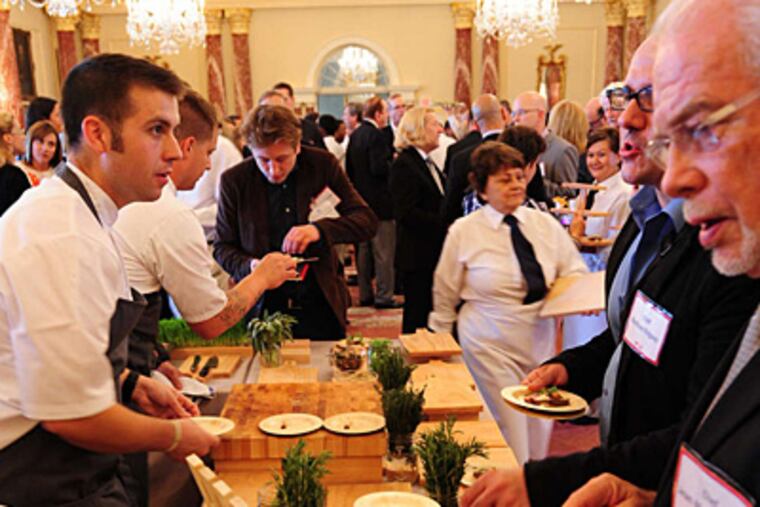Seven local chefs named to American Chef Corps
WASHINGTON - Philadelphia's capital culinary cred was on display here last week, when seven area chefs were named to the American Chef Corps, a new State Department program engaging the country's top toques to foster diplomacy among nations.

WASHINGTON - Philadelphia's capital culinary cred was on display here last week, when seven area chefs were named to the American Chef Corps, a new State Department program engaging the country's top toques to foster diplomacy among nations.
Chef Joe Cicala of Le Virtú, who was thrilled to be tapped along with some of his "culinary heroes," believes this is an opportunity for him to serve his country with what he does best.
Chef Jean-Marie Lacroix, the old-guard French master at the restaurant that still bears his name after his departure, considers it a chance to show the world how far American cuisine has evolved.
And Matthew Ridgway, the chef behind PorcSalt charcuterie, sees himself as an ambassador of our improving sustainable foodways and a champion of America's nonindustrial farmers.
All three attended the event, at which the State Department, in partnership with the James Beard Foundation, recognized 90 chefs from across the country who have agreed to use their expertise to advance diplomacy.
The other local chefs named were Guillermo Pernot of Cuba Libre, Kevin Sbraga of Top Chef fame and owner of Sbraga, Masaharu Morimoto of Morimoto, and Peter Callahan, a caterer from Haverford whose signature miniatures (burgers, fries, fish tacos, and mac-and-cheese canapés) were circulating through the stately reception rooms along with the specialties of other participating chefs.
"We have an awesome responsibility to get this right," White House chef Sam Kass said, speaking at the event. "Besides grandmothers, chefs are about the only ones with real food knowledge anymore. Our skills can further diplomatic relationships and transcend barriers."
Collaborating with renowned chefs at official functions and employing chefs as resources in cultural exchange, the partnership exemplifies Secretary of State Hillary Rodham Clinton's "smart power" approach to diplomacy, which encourages the use of every tool available.
"Showcasing favorite cuisines, ceremonies, and values is an often-overlooked and powerful tool of diplomacy," Clinton said in a prepared statement. "The meals that I share with my counterparts at home and abroad cultivate a stronger cultural understanding between countries and offer a unique setting to enhance the formal diplomacy we conduct every day."
Exactly what will be asked of each chef will evolve as opportunities arise.
"We might be invited down to cook at a private 20-person dinner at the White House, or at a banquet, where multiple chefs would be involved," Cicala said.
Also, if chefs are traveling abroad, they may be asked to do an event with the American embassy in that country. The relationship is strictly voluntary: The chefs are not paid for their time or travel expenses. But that did not seem to matter to many of the participants.
"It's very rare that I get to serve my country without having to enlist in the military," Cicala said. "It is a great honor and a great opportunity to give back. Plus, I have to be honest, it's a wonderful network. I was in the room with all my culinary heroes, Rick Bayless, José Andrés, April Bloomfield. . . . Frankly, I was honored that they knew who I was."
Ridgway believes the program offers a chance to present chefs in a more flattering light.
"I think it is great for our profession to have chefs contributing in a more positive way. Instead of becoming TV rock stars, this gives us a chance to give back. We have so much information, it behooves us to transfer that education," he said.
Ridgway said that with the invitation to participate came a questionnaire, asking what each chef could contribute, and the areas of expertise.
"I have a unique background, having worked as a French chef [at Lacroix among other restaurants] and having started a small business, where I have a lot of connections with small farmers and artisan producers. I understand their problems and hardships, and I want to contribute, if I can, in that area. Explaining why it's so important to preserve these small farms and sustainable practices."
Jean-Marie Lacroix has seen the American food culture revolutionized during the quarter century he has been cooking in Philadelphia.
"It would be great to cook some dinners at the White House," he said. "I would love to do that."
And he is more than willing to cook at embassy dinners when he travels to his native France, as well as Italy and Spain, which he does regularly.
But he also sees it as a great opportunity to promote and showcase not only the best of American cooking, but the best of American produce and products.
"It is just amazing what you can find in this country now," he said. "I remember when you could not find endive." But now he said he has no trouble sourcing the best coffee, the finest cheese, and the highest-quality produce.
"It is a big moment for taste in America," he said. "It is a great idea to celebrate how far food has come in this country."
But he also believes that Americans are much more receptive to new foods and flavors from other cultures, and that that can lead to openness on other levels.
"When you share a meal with people from another country, you understand each other better," he said.
"Oftentimes," he said, "I think we can accomplish much more around the table than in a formal meeting."